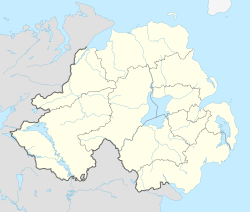Derrymacash
| |
|---|---|
Location within Northern Ireland | |
| Population | 629 (2001) |
| Irish grid reference | J035601 |
| • Belfast | 25 mi (40 km) |
| • Dublin | 78 mi (126 km) |
| District | |
| County | |
| Country | Northern Ireland |
| Sovereign state | United Kingdom |
| Post town | CRAIGAVON |
| Postcode district | BT66 |
| Dialling code | 028 |
| Police | Northern Ireland |
| Fire | Northern Ireland |
| Ambulance | Northern Ireland |
| UK Parliament | |
| NI Assembly | |
Derrymacash (from Irish Doire Mhic Cais, meaning 'Oakgrove of MacCash') [1] is a small village and townland in County Armagh, Northern Ireland. It is about four miles west of Lurgan, between the M1 motorway and Lough Neagh. It had a population of 629 in the 2001 census. [2]
Contents
A Catholic church and primary school (both called St Patrick's) are in neighbouring Aghacommon. Many people mistake the townlands of Derrymacash and Aghacommon. Derrymacash starts after one crosses the Closet River, just beyond the M1 bridge, heading towards Lough Neagh Via Ronan Nixon.

